|
The common cold is a viral infection of the upper respiratory tract which is associated with symptoms like a runny nose, sneezing, an itchy or sore throat, cough, nasal congestion, a low-grade fever, slight body aches or a mild headache. People tend to experience slightly different symptoms when suffering from a cold, as over 200 types of viruses are known to cause it.
Most people recover from a common cold in about a week or two. Sometimes, a cough is the most annoying symptom and it lingers for weeks even after the infection has cleared. This is because the airways may still be inflamed and sensitive to triggers like dry air, smoke and dust.
In traditional Chinese Medicine (TCM), the common cold is associated with lung dysfunction. The lung system disseminates protective qi over the body's surface, which forms the first barrier against the invasion of external pathogens. Cold symptoms are the result of a battle between the protective qi and the external pathogens in the superficial portion of the body. Besides the body's natural resistance, environment and seasonal factors play important roles in determining what pathogens are prevalent. Generally, wind evils are the leading pathogens and they are often accompanied by cold, heat or dryness evils, making people have different symptoms when they have a cold. When coughing becomes a major complaint, it means the pathogens have disturbed qi activities inside the lungs. TCM treatment for cough and cold symptoms aimed to:
- Facilitate the protective qi to dispel the pathogens through the body surface; commonly used herbs are perilla leaf, ephedra, fresh ginger, peppermint, chrysanthemum and mulberry leaf.
- Promote the lungs and smooth the qi flows inside the organ; commonly used herbs are balloonflower root, ephedra, bitter apricot kernel, hogfennel root, sessile stemona root and cynanchum rhizome.
- Resume flow of normal secretions in the throat or airways, commonly used herbs are great burdock fruit, white mustard seed, snakegourd peel, fritillary bulb, dried pear, tatarian aster root, common coltsfoot flower, pinellia tuber and tangerine peel.
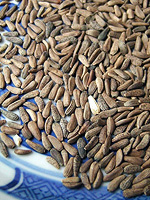 |
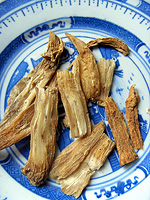 |
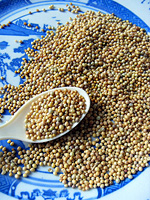 |
Great burdock fruit |
sessile stemona root |
white mustard seed |
Depending on how the body responds, TCM physicians study the cough pattern and the accompanied symptoms in detail, diagnose a disharmony pattern and choose a remedy accordingly. Three disharmony patterns are commonly seen in cough and cold symptoms, just clicks the links below and see the herbal remedies:
When the cold symptoms clear, but a hacking cough remains, the Stop Coughing Powder may be suitable. The consequence is due to retained wind evils disturbing the lungs. Stop Coughing Powder is a mild prescription in which the schizonepeta herb dispels the wind evils through body surface; stemona root, cynanchum rhizome and tatarian aster root smooth qi flows inside the lungs; liquorice root, tangerine peel and balloonflower root soothe the throat and dissolve the mucus. With appropriate modification, it is usually used for persist coughs after upper respiratory infections.
When treating cough and cold symptoms, TCM herbal remedies are tailor-made to target different aspects of the problem, promote a comprehensive healing process, that can suppress the urge to cough, soothe an itchy or sore throat, promote expectoration, relieve nasal congestion, ease breathing, and alleviate headache and fatigue. They deliver a general feeling of wellness, and will not induce the drowsiness or other unwanted side effects caused by antihistamines or decongestants.
In TCM experience, coughs caused by external pathogen invasion are not difficult to treat and can be relieved in a short time. However, ineffective management of a cough can easily see the cough develop into chronic, necessitating long-term treatment. Take an improper diet for example. Eating too many cold and raw foods will weaken the spleen, make it produce phlegm and dampness which will disturb lung functioning; on the other hand, over-consumption of hot and spicy foods promote heat accumulation, which dries up the lungs and makes the mucus sticky and hard to expectorate. When this type of cough is associated with internal damage, there is no quick way of getting rid of.
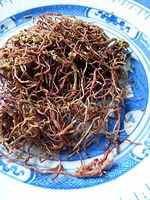 |
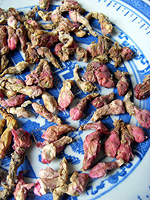 |
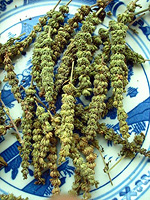 |
Tatarian aster root |
common coltsfoot flower |
schizonepeta herb |
|